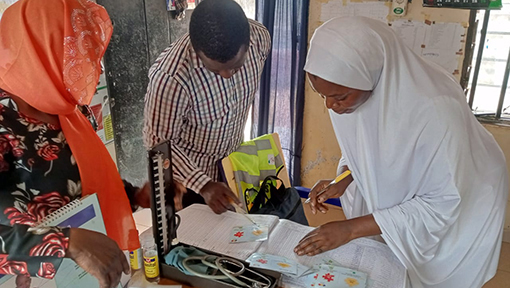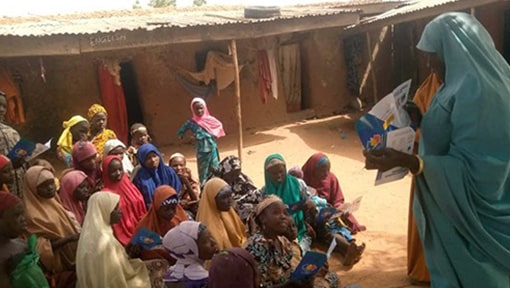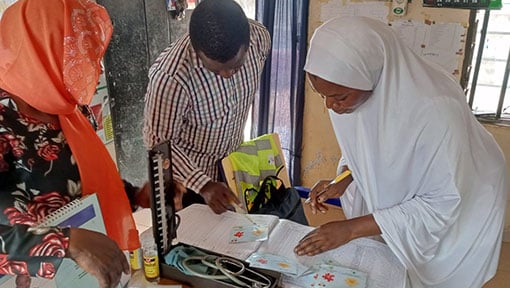Firozabad’s Auxiliary Nurse Midwives Help Alleviate Staff Burden on FDS Days
by The TCIHC Team | Nov. 2, 2018Contributors: Deepak Tiwari, Deepti Mathur and Mukesh Sharma
Because of TCIHC, the fixed-day static (FDS) services approach is now part of an auxiliary nurse midwife’s (ANM) official job description, alleviating staffing shortages at Firozabad’s UPHCs on FDS days.

An auxiliary nurse midwife counseling a family at a Firozabad UPHC.
Firozabad was one of the first cities in India to demonstrate how The Challenge Initiative for Healthy Cities (TCIHC) and its high-impact approaches can facilitate the uptake of family planning among the urban poor.
But when this “city of glass” first started organizing the fixed-day static (FDS) services approach, it experienced some challenges. FDS is where trained staff, equipment, supplies and commodities are made available on a pre-announced day and time at urban primary health centers (UPHCs). First, the TCIHC team came up with a more efficient process for implementing FDS called the 30-Hour Magic Plus approach with all the requirements taken care of in 30 hours. This impressed Firozabad’s Chief Medical Officer and led to FDS being implemented at all nine of the city’s UPHCs.
But then a shortage of trained providers made it impossible to conduct FDS every week and make it part of the routine services. Of the nine TCIHC-supported UPHCs, only three had a Medical Officer-In-Charge (MOIC), and one of those was away for training. Seven UPHCs had to make alternate arrangements to manage its patient workload typically overburdening the pharmacist or staff nurse.
This situation was worse on FDS days where the patient load is even higher. TCIHC’s team noticed that staff nurses on FDS days were so busy that patients had long wait times, thus frustrating and discouraging them from coming back to the UPHC. One bad experience at a health facility can also mean negative word-of-mouth throughout the community. TCIHC saw the need for additional human resources to support the staff nurse, so quality family planning services could be provided.
But since TCIHC has no control over UPHC staffing, the team asked the UPHC’s MOIC and staff nurse to assign auxiliary nurse midwives (ANMs) to be stationed in the UPHC on the day of FDS. Each UPHC has five ANMs attached to it, so this could greatly alleviate some of the patient load burden on the staff nurse. The staff nurse agreed that this would be helpful. TCIHC along with the staff nurse approached the ANMs to seek their support.
Tuesday was selected as FDS day because ANMs are in the field on Wednesdays and Saturdays for immunization days. With FDS set for Tuesdays and ANMs ready and available to assist staff nurses, the days became more organized. Staff nurses appeared less stressed and the ANMs seemed purposefully and gainfully occupied.
The idea of using ANMs on FDS days was shared during the National Urban Health Mission (NUHM) review meeting, pleasing the Chief Medical Officer (CMO) and facility-in-charge.

A wall painting of the ANMs’ job description showing the addition of “Fixed-day static services day” in Hindi.
The CMO suggested that since ANMs had already bought into working in the facility every Tuesday, it be added to their official job description. Since the ANMs were already performing this duty, they readily accepted and, as seen in the image to the right, FDS has been added to their job description.






